Auto Alternator ?
-
Challenger949L
- Almost a Finish Carpenter
- Posts: 80
- Joined: Sun Aug 21, 2005 10:17 pm
- Boat Name: ESPADON Kittiwake
- Boat Type: Sabre 28, Alden Challenger
- Location: Central Virginia
Auto Alternator ?
So, this morning I was wandering through my basement. When I stumbled upon an alternator I had pulled out of a salvage Volvo 240. Now,the alternator on my Sabre 28's Volvo MD7a is bad and I got to wondering if I could use this old Volvo 240 Alt. as a substitute. I don't know if the attatchments would work or any of that, but Why should I not use an automobile alternator on my sailboat?
Jimmy Small
Jimmy Small
- Chris Campbell
- Candidate for Boat-Obsession Medal
- Posts: 422
- Joined: Tue Jun 06, 2006 9:18 am
- Boat Name: Luna
- Boat Type: Yankee 30
- Location: Chester, NS
- Contact:
Re: Auto Alternator ?
An auto alternator should hook up and work, but has two important differences compared with a marine alternator. The marine alternator will have marinized parts used, so it will last longer in the salt-water environment (won't rust as fast); and the marine unit will be ignition-protected, meaning it won't throw sparks and ignite any gases it finds. This isn't so important in a car since the engine compartment where the alternator works is open to the air and there will never be a build up of explosive gases, but in a boat where the engine compartment is down in the hull - any heavier-than-air gases (propane, gasoline vapor) can collect and subsequently explode.
If you regularly run a blower to clear out the engine compartment of fumes, or you don't have any sources of fumes - and you don't mind more frequent replacements (and the greater potential of needing an alternator when you'd least like it), then an automotive alternator is fine. Many boats are using them successfully right now.
If you regularly run a blower to clear out the engine compartment of fumes, or you don't have any sources of fumes - and you don't mind more frequent replacements (and the greater potential of needing an alternator when you'd least like it), then an automotive alternator is fine. Many boats are using them successfully right now.
-
Paulus
- Skilled Systems Installer
- Posts: 199
- Joined: Mon Nov 22, 2010 12:05 pm
- Boat Name: Guillemot
- Boat Type: Mariner Ketch
Re: Auto Alternator ?
This link http://www.boatelectric.com/alternat.htm should provide a few answers and some food for thought..
-
Triton106
- Candidate for Boat-Obsession Medal
- Posts: 392
- Joined: Fri Apr 18, 2003 4:51 pm
- Location: San Francisco Bay Area
Re: Auto Alternator ?
Jimmy,
I have also wondered about the same question but never bothered to look for the answer. So thanks for bring it up.
I looked up John Payne's The Marine Electrical and Electronics Bible it states that to marinize an alternator you need to perform three tasks:
1. Bearings should be completely enclosed. They should be replaced if not. (this is to prevent accidental spark)
2. Windings should be encapsolated with high grade insulating spray. (this is to prevent corrosion)
3. The back of the diode plate should be sprayed with insulating spray to prevent corrosion. (this is similar to what stereo manufacturers do with assembly board)
If you are going to marinize your volvo alternator or use it without modifcation I would be interested in your experience.
Best,
I have also wondered about the same question but never bothered to look for the answer. So thanks for bring it up.
I looked up John Payne's The Marine Electrical and Electronics Bible it states that to marinize an alternator you need to perform three tasks:
1. Bearings should be completely enclosed. They should be replaced if not. (this is to prevent accidental spark)
2. Windings should be encapsolated with high grade insulating spray. (this is to prevent corrosion)
3. The back of the diode plate should be sprayed with insulating spray to prevent corrosion. (this is similar to what stereo manufacturers do with assembly board)
If you are going to marinize your volvo alternator or use it without modifcation I would be interested in your experience.
Best,
Ray D. Chang
Triton 106 in Berkeley, CA
Triton 106 in Berkeley, CA
-
Maine Sail
- Skilled Systems Installer
- Posts: 243
- Joined: Fri Feb 24, 2006 10:47 am
- Location: Casco Bay
- Contact:
Re: Auto Alternator ?
With the exception of an alt being ignition protected, which on some is nothing more than a piece of high temp felt sealing brushes from sparks, I have never seen a modern auto alternator that was not sufficiently prepared for the marine environment in an enclosed engine space inside a cabin.
Keep in mind that many of us live in the great white North where road salt, pot holes filled with salty water, road dirt and giant puddles are the norm. Our engines and alternators are splashed and peppered with moisture, salt and road grime into our engine compartments on a daily basis. I wash the engines on our vehicles about three to four times per winter, just did my Toyota last week, and I still barely keep up.
I have never, ever seen the inside of my vessels engien room peppered with any salt spray or splashed via a huge puddle or caked in dried salt or salty road dirt like the cars are up here in the North East or anywhere in this country that uses road salt or sees puddles. Perhaps riding out a Nor'Easter or Hurricane might get some moisture in there but then you'd likely have bigger issues.. Car alternators are very often far more abused than a marine alternator and most all of them are sufficiently marinized for the environment, except for ignition spark protection. I don't recall the last time I saw an auto alternator with non-sealed bearings.
What you want to watch for is the proper voltage setting. If it is an old Volvo alt it could very well be set to 13.6-13.8 volts which is will be very slow to charge. To test this you'll want your batteries at 100% state of charge and with it running and then measure the voltage output at the B+ terminal. It should be 14.2-14.4 volts. If it is then you'll want to find out how the marine version is ignition protected then order that part. Truth be told I come across many diesel engines with non-ignition protected alts but still I would not risk it personally.
This piece of felt is what ignition protects this alt.
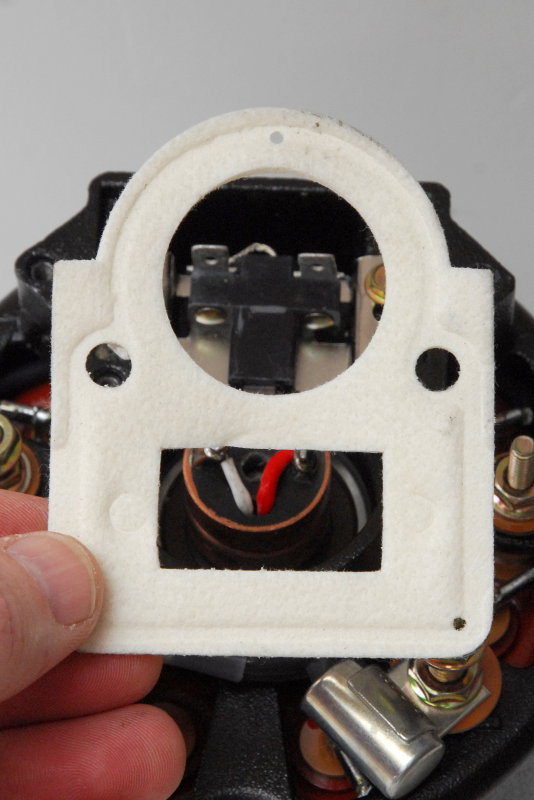
Keep in mind that many of us live in the great white North where road salt, pot holes filled with salty water, road dirt and giant puddles are the norm. Our engines and alternators are splashed and peppered with moisture, salt and road grime into our engine compartments on a daily basis. I wash the engines on our vehicles about three to four times per winter, just did my Toyota last week, and I still barely keep up.
I have never, ever seen the inside of my vessels engien room peppered with any salt spray or splashed via a huge puddle or caked in dried salt or salty road dirt like the cars are up here in the North East or anywhere in this country that uses road salt or sees puddles. Perhaps riding out a Nor'Easter or Hurricane might get some moisture in there but then you'd likely have bigger issues.. Car alternators are very often far more abused than a marine alternator and most all of them are sufficiently marinized for the environment, except for ignition spark protection. I don't recall the last time I saw an auto alternator with non-sealed bearings.
What you want to watch for is the proper voltage setting. If it is an old Volvo alt it could very well be set to 13.6-13.8 volts which is will be very slow to charge. To test this you'll want your batteries at 100% state of charge and with it running and then measure the voltage output at the B+ terminal. It should be 14.2-14.4 volts. If it is then you'll want to find out how the marine version is ignition protected then order that part. Truth be told I come across many diesel engines with non-ignition protected alts but still I would not risk it personally.
This piece of felt is what ignition protects this alt.

-
Triton106
- Candidate for Boat-Obsession Medal
- Posts: 392
- Joined: Fri Apr 18, 2003 4:51 pm
- Location: San Francisco Bay Area
Re: Auto Alternator ?
Maine Sail,
You made a good point in comparing auto alternator environment in the NE with marine alternator environment. Here in CA there is no issue with road salt to attack our car (unless you drive into the Sierra Mountains) so we don't the experience with the environment an NE auto alternator lives in. When I travel to the NE I do see a lot of cars with rusted body panels but have not heard (which does not that it does not exit) corroded alternators. On the other hand the moisture in the marine environment here does attack unprotected metal parts. For example, my Atomic 4 is constantly under attack from rust. The non-marine stereo the PO installed was a pile of rusted junk when I bought the boat. Therefore, my concern (which may not be valid) is that even if we don't have boarding waves crashing into the engine room the alternator may still be subject to the same corroding environment as the Atomic 4 and the stereo. On the other hand the marinized alternator on Blossom has not yet had any rust issues so far (I have had Blossom for 10 years now and I don't know when the PO installed the current alternator). Just my observations, not meant to be scientic evidence.
On ignition protection I would whole-heartedly agree with you that it is a good practice in the marine environment, especially if there is a gas engine or propane/NPG appliance on board. The bearing enclosure modification does not appear to be too difficult from this Motorola picture.
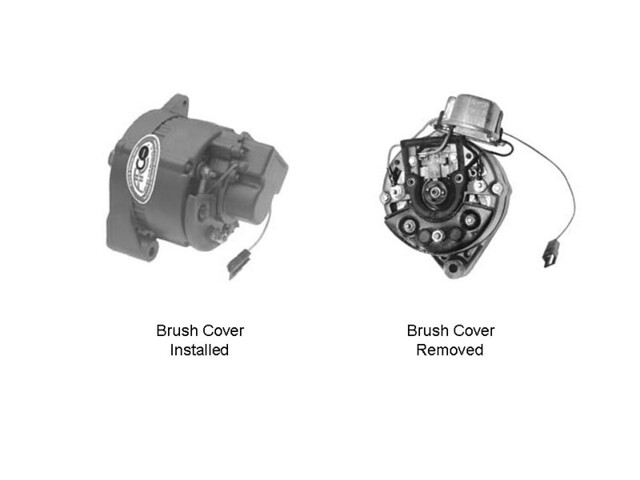
Best,
You made a good point in comparing auto alternator environment in the NE with marine alternator environment. Here in CA there is no issue with road salt to attack our car (unless you drive into the Sierra Mountains) so we don't the experience with the environment an NE auto alternator lives in. When I travel to the NE I do see a lot of cars with rusted body panels but have not heard (which does not that it does not exit) corroded alternators. On the other hand the moisture in the marine environment here does attack unprotected metal parts. For example, my Atomic 4 is constantly under attack from rust. The non-marine stereo the PO installed was a pile of rusted junk when I bought the boat. Therefore, my concern (which may not be valid) is that even if we don't have boarding waves crashing into the engine room the alternator may still be subject to the same corroding environment as the Atomic 4 and the stereo. On the other hand the marinized alternator on Blossom has not yet had any rust issues so far (I have had Blossom for 10 years now and I don't know when the PO installed the current alternator). Just my observations, not meant to be scientic evidence.
On ignition protection I would whole-heartedly agree with you that it is a good practice in the marine environment, especially if there is a gas engine or propane/NPG appliance on board. The bearing enclosure modification does not appear to be too difficult from this Motorola picture.

Best,
Ray D. Chang
Triton 106 in Berkeley, CA
Triton 106 in Berkeley, CA
-
Maine Sail
- Skilled Systems Installer
- Posts: 243
- Joined: Fri Feb 24, 2006 10:47 am
- Location: Casco Bay
- Contact:
Re: Auto Alternator ?
I suspect a lot has to do with your level of interior moisture, wet bilge etc.. I have an 8 year old Kenwood car stereo that has zero rust inside it or on the outside of it.
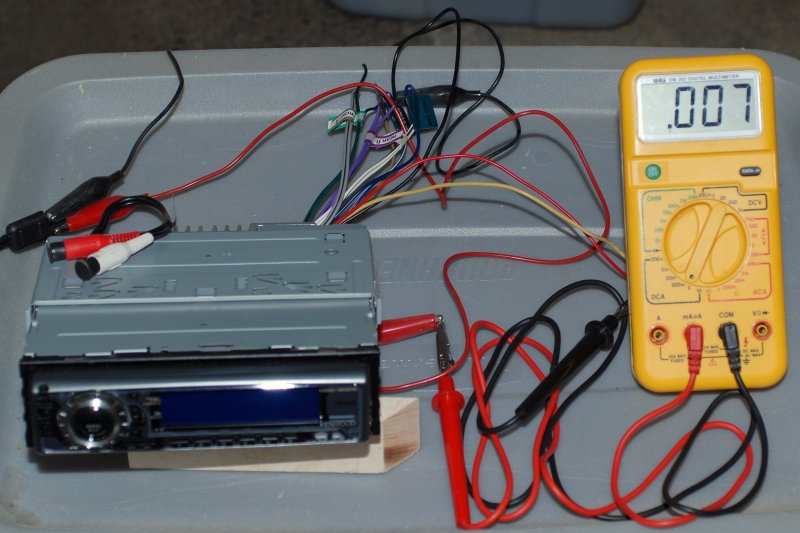
I live only 30 yards from the ocean so I doubt my house and work shop see much more salt air content than my boat and I don't suffer from short electronic life.
Take a look at my 25 year old Delta drill press. The motor and all electronic components still work flawlessly yet the iron surfaces are badly rusted with surface rust. Keeping up with my Jointer and table saw is a chore. This is not uncommon living this close to the ocean.
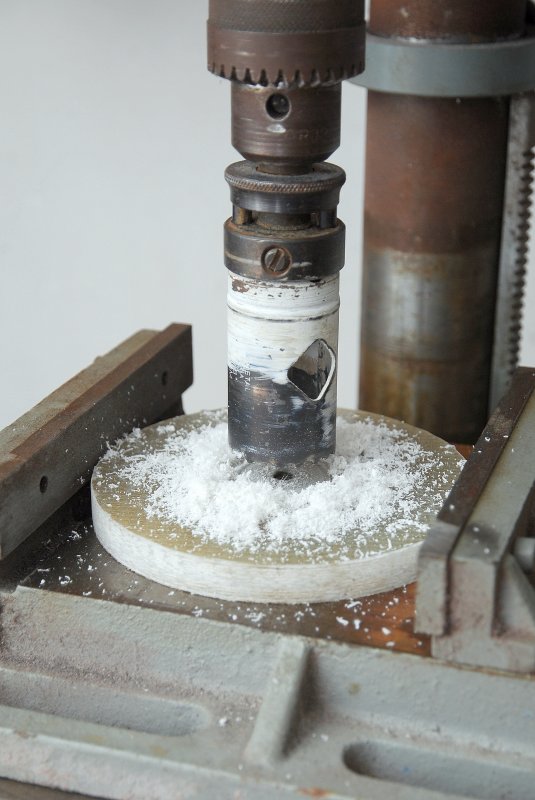
I have rebuilt a fair number of alternators that sell as both "marinized" units and industrial/auto non-marinized units. The only differences are in the ignition protection.
http://www.pbase.com/mainecruising/alte ... ild&page=1
That alt comes stock on Westerbeke engines and also skid steers, industrial generators, lawn mowers etc. etc..There is no difference between the one that comes on the Westerbeke and the ones that come on industrial equipment as the base engine is a Mitsubishi not a Westerbeke. The only difference is that the Westerbeke alt sells with a Westerbeke part number and unless you know how to source this stuff well you'll pay $600.00+ vs. $130.00 for the same identical unit. Mine is still going strong at 3200 hours of use in the marine environment. I re-built it just because I had it out and only replaced the front bearing which cost me just $12.00.
The Leece-Neville/Prestolite/Motorola units, also re-manufactured by companies like Arco, are a prime example of marinized vs. non. Some of these marinized units, as designated by an MR in the model number, are powder coated and some MR units are bare aluminum yet both are "marinized". This from the same manufacturer yet they both bear the 8MR (marine) designation.
Powder Coated 8MR:
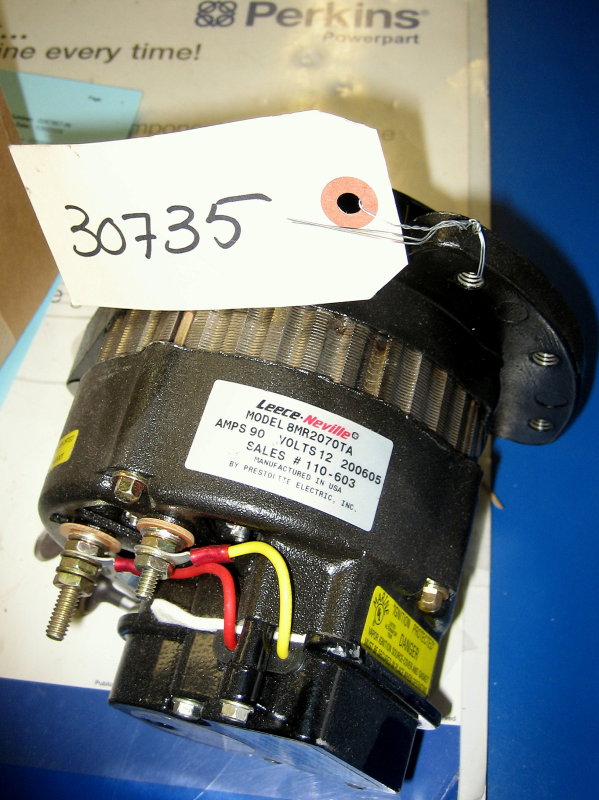
Bare Aluminum 8MR:
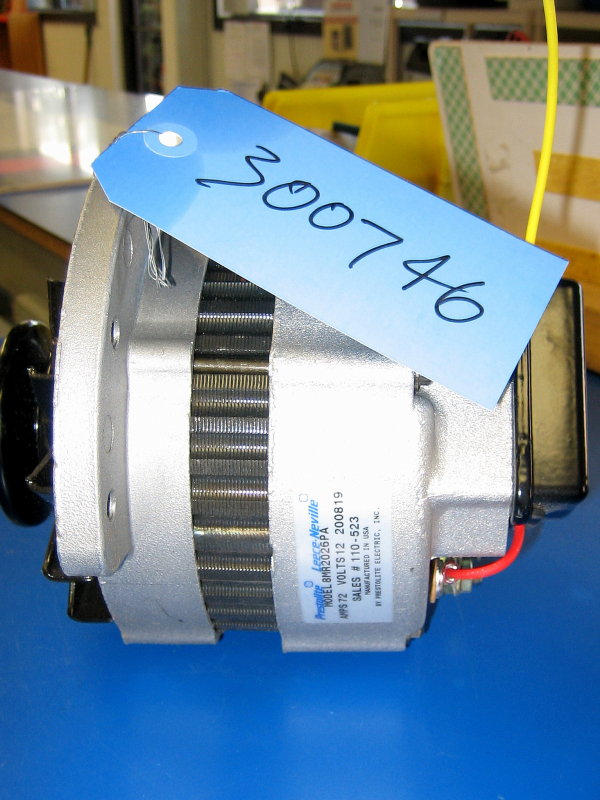
The non painted ones hold up fine just as aluminum skiffs do. The internal workings all bear the same part numbers from bearings to brush holders whether you buy a Moto case alt that bears the MR designation or not, the only differences are in the ignition protection. I have re-built both marinized Moto case alts and non, same stuff. The Delco units are the same way. Alternators are already built to take wet environments not just damp and humid.
People often discount the importance of keeping a dry bilge, and this can be tough on many boats, but it does make a huge difference in interior moisture in the boat.
When it comes to modern alternators the "marinizing" label usually just dents your wallet and ignition protection can often be added, to any similar case alt, and convert it to a marinized unit by a mom & pop alt shop for a few bucks.
By the way Balmar alternators are made by Leece-Neville yet you pay more than THREE times the price for them.
Balmar Model 81 over $600.00:
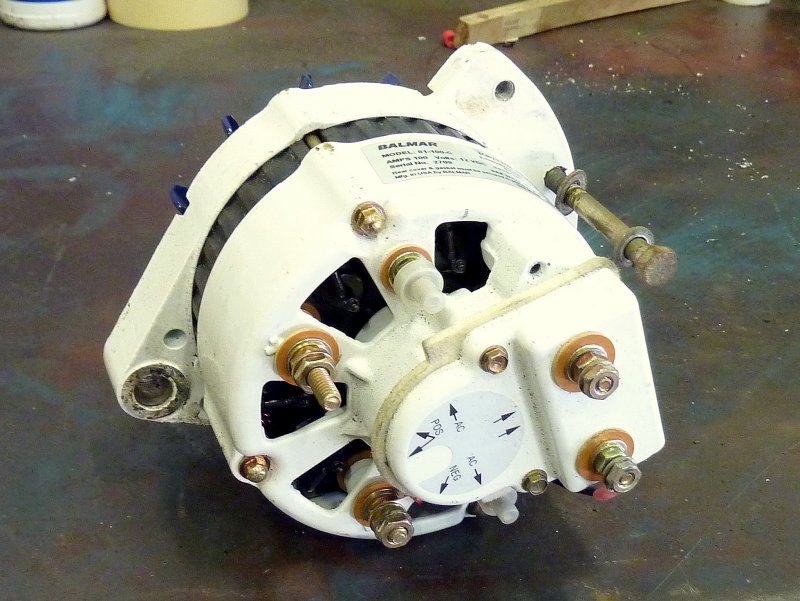
Leece-Neville 8MR Series converted to external regulation by me for $215.00:
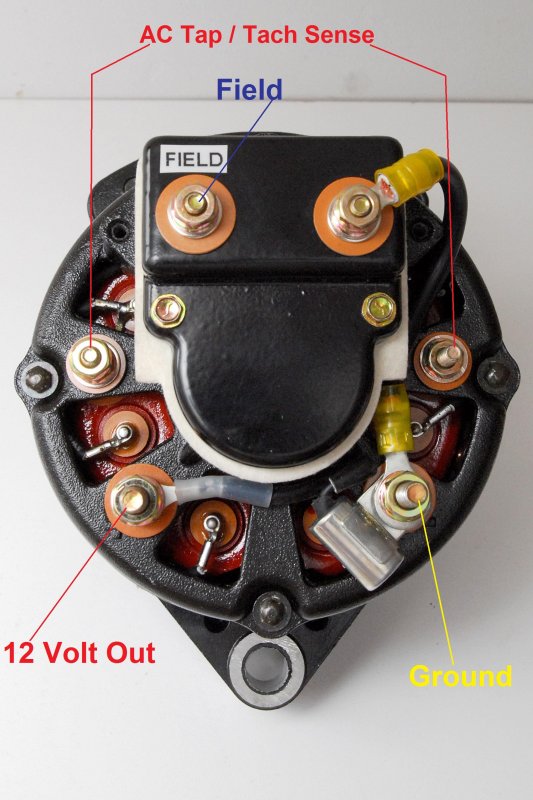
Take these alts apart and they are identical to the Leece Neville 8MR series.

I live only 30 yards from the ocean so I doubt my house and work shop see much more salt air content than my boat and I don't suffer from short electronic life.
Take a look at my 25 year old Delta drill press. The motor and all electronic components still work flawlessly yet the iron surfaces are badly rusted with surface rust. Keeping up with my Jointer and table saw is a chore. This is not uncommon living this close to the ocean.

I have rebuilt a fair number of alternators that sell as both "marinized" units and industrial/auto non-marinized units. The only differences are in the ignition protection.
http://www.pbase.com/mainecruising/alte ... ild&page=1
That alt comes stock on Westerbeke engines and also skid steers, industrial generators, lawn mowers etc. etc..There is no difference between the one that comes on the Westerbeke and the ones that come on industrial equipment as the base engine is a Mitsubishi not a Westerbeke. The only difference is that the Westerbeke alt sells with a Westerbeke part number and unless you know how to source this stuff well you'll pay $600.00+ vs. $130.00 for the same identical unit. Mine is still going strong at 3200 hours of use in the marine environment. I re-built it just because I had it out and only replaced the front bearing which cost me just $12.00.
The Leece-Neville/Prestolite/Motorola units, also re-manufactured by companies like Arco, are a prime example of marinized vs. non. Some of these marinized units, as designated by an MR in the model number, are powder coated and some MR units are bare aluminum yet both are "marinized". This from the same manufacturer yet they both bear the 8MR (marine) designation.
Powder Coated 8MR:

Bare Aluminum 8MR:

The non painted ones hold up fine just as aluminum skiffs do. The internal workings all bear the same part numbers from bearings to brush holders whether you buy a Moto case alt that bears the MR designation or not, the only differences are in the ignition protection. I have re-built both marinized Moto case alts and non, same stuff. The Delco units are the same way. Alternators are already built to take wet environments not just damp and humid.
People often discount the importance of keeping a dry bilge, and this can be tough on many boats, but it does make a huge difference in interior moisture in the boat.
When it comes to modern alternators the "marinizing" label usually just dents your wallet and ignition protection can often be added, to any similar case alt, and convert it to a marinized unit by a mom & pop alt shop for a few bucks.
By the way Balmar alternators are made by Leece-Neville yet you pay more than THREE times the price for them.
Balmar Model 81 over $600.00:

Leece-Neville 8MR Series converted to external regulation by me for $215.00:

Take these alts apart and they are identical to the Leece Neville 8MR series.
-
Triton106
- Candidate for Boat-Obsession Medal
- Posts: 392
- Joined: Fri Apr 18, 2003 4:51 pm
- Location: San Francisco Bay Area
Re: Auto Alternator ?
Maine Sail,
I cannot thank you enough for your generosity with your time and knowledge. This information is invaluable and is exactly what I have been wondering all these years! No, more than what I was hoping to learn.
One quick question, if I were to buy a used alternator as a back-up what typical parts do I need to replace during a rebuilt? I realize that it may depend on the condition of the particular unit. You mentioned the replacement of the bearing in your example. Should I also replace brushes, regulator parts, etc.?
I also agree that keeping bilge dry makes a huge difference to how well the electronics fare. During the summer time when I can keep the bilge dry the corrosion problem is almost non-existent. Winter is a different story due to rains getting into the bilge through the cowl vents.
Best,
I cannot thank you enough for your generosity with your time and knowledge. This information is invaluable and is exactly what I have been wondering all these years! No, more than what I was hoping to learn.
One quick question, if I were to buy a used alternator as a back-up what typical parts do I need to replace during a rebuilt? I realize that it may depend on the condition of the particular unit. You mentioned the replacement of the bearing in your example. Should I also replace brushes, regulator parts, etc.?
I also agree that keeping bilge dry makes a huge difference to how well the electronics fare. During the summer time when I can keep the bilge dry the corrosion problem is almost non-existent. Winter is a different story due to rains getting into the bilge through the cowl vents.
Best,
Ray D. Chang
Triton 106 in Berkeley, CA
Triton 106 in Berkeley, CA
-
Maine Sail
- Skilled Systems Installer
- Posts: 243
- Joined: Fri Feb 24, 2006 10:47 am
- Location: Casco Bay
- Contact:
Re: Auto Alternator ?
Ray,Triton106 wrote:Maine Sail,
I cannot thank you enough for your generosity with your time and knowledge. This information is invaluable and is exactly what I have been wondering all these years! No, more than what I was hoping to learn.
One quick question, if I were to buy a used alternator as a back-up what typical parts do I need to replace during a rebuilt? I realize that it may depend on the condition of the particular unit. You mentioned the replacement of the bearing in your example. Should I also replace brushes, regulator parts, etc.?
I also agree that keeping bilge dry makes a huge difference to how well the electronics fare. During the summer time when I can keep the bilge dry the corrosion problem is almost non-existent. Winter is a different story due to rains getting into the bilge through the cowl vents.
Best,
If you find an alternator there are things you'll want to look for especially if you have a diesel.
An AC tap to drive the tachometer (many auto units do not offer this but any alt shop can tap into it)
Regulator that puts out 14.2 to 14.6 you do not want anything below 14 volts
Internal regulators either work or they usually don't no need to replace on re-build
Bearings that usually go are the front ones but they are cheap enough
Brushes can last a long time these days but if the brush assembly is easy, replace it.
Basically find one and take it to your mom/pop rebuilder and they will set you up. Most any good sized town near water will have a guy who can do this you just need to search. I have two guys I use locally that can do it for less than I can, when I add in my time.
As for Jimmy the older MD7A's originally came with a 35A Motorola alt if memory serves me correctly. Any of the Leece-Neville 8MR series alts or the Moto cases from API or Arco will fit even a Mando alt will fit that motor. If it is a 2" foot and you buy a 1" foot Moto case alt just add a 1" spacer.. The Mando, API, and Arco units are not the same quality of the Leece-Neville/Prestolite units but are decent alternators. When you can buy a Leece-Neville for under $200.00 new though why bother with a reman or knock off..
I generally buy my Leece-Neville alts from ASE supply..
-
Triton106
- Candidate for Boat-Obsession Medal
- Posts: 392
- Joined: Fri Apr 18, 2003 4:51 pm
- Location: San Francisco Bay Area
Re: Auto Alternator ?
Maine Sail,
Thank you again for your expertise on the subject!
BTW, my friend Luke sails a CS36 in the Bay Area too. He likes so much that he bought a CS40. Now he has two boats of similar design, size; one for the east coast, one for the west coast. Crazy guy.
Happy New Year!
Thank you again for your expertise on the subject!
BTW, my friend Luke sails a CS36 in the Bay Area too. He likes so much that he bought a CS40. Now he has two boats of similar design, size; one for the east coast, one for the west coast. Crazy guy.
Happy New Year!
Ray D. Chang
Triton 106 in Berkeley, CA
Triton 106 in Berkeley, CA